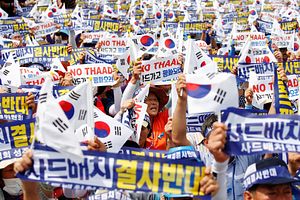South Korea deported two Korean-American activists on Tuesday after they tried to enter the country for a “peace tour” that would have seen them take part in protests against a controversial missile defense system, one of the campaigners said.
Hyun Lee and Juyeon Rhee, members of the U.S.-based Solidarity Committee for Democracy and Peace in Korea (SCDPK), were refused admission by immigration after being told they had been flagged by the South Korean intelligence services, Lee said.
The pair, who have been strong critics of South Korean president Park Geun-hye and U.S. policy on the Korean Peninsula, were told they had been denied under a section of immigration law that allows refusal of people harmful to the “national interests” of the country, according to Lee.
Lee, who is associated with several Korean activists groups including the Los Angeles-based Korea Policy Institute, said the pair had intended to join Veterans for Peace, an American anti-war group, in protesting the deployment of THAAD in Seongju, a rural county about 180 miles from Seoul.
The move to introduce the U.S. anti-missile system to South Korea has sparked angry protests from Seongju inhabitants who fear the health effects of electromagnetic waves from its radar, as well as a stern rebuke from China. The Park government insists THAAD is necessary to counter North Korea’s growing missile threats and poses no health risks to residents or military threat to Beijing.
In a statement, SCDPK called the deployment a “provocative move against North Korea, China, and Russia” that will “redraw Cold War lines as well as escalate tensions in a region that is already heavily militarized with weapons of mass destruction.”
Seoul, which criminalizes praise of North Korea under the anti-communist National Security Law, has denied left-wing activists entry to the country on previous occasions. In May, a German citizen of Korean descent was refused entry after trying to attend a conference to commemorate the anniversary of the democracy movement in Gwangju, a city that was the site of a bloody crackdown on democracy activists during the dictatorship of the 1980s.
While it is uncertain exactly why they were denied entry, Lee and Rhee have been associated with comments denouncing perceived U.S. imperialism and the demonization of North Korea.
“We believe our deportation is part of the Park administration’s attempt to isolate Seongju residents and prevent peace activists from internationalizing the fight to oppose THAAD,” Lee told The Diplomat.
“We have both traveled to South Korea numerous times in the past,” Lee added, explaining that she saw the deportation as part of a broader crackdown on dissent by the Park administration. “We have never broken any laws in South Korea; we have never been denied entry nor deported.”
Tim Shorrock, a journalist who is also a member of SCDPK, slammed the deportation as repressive.
“How can the ROK (Republic of Korea) call itself a democracy and ban U.S. citizens just for holding views contrary to the government?” he said.

































